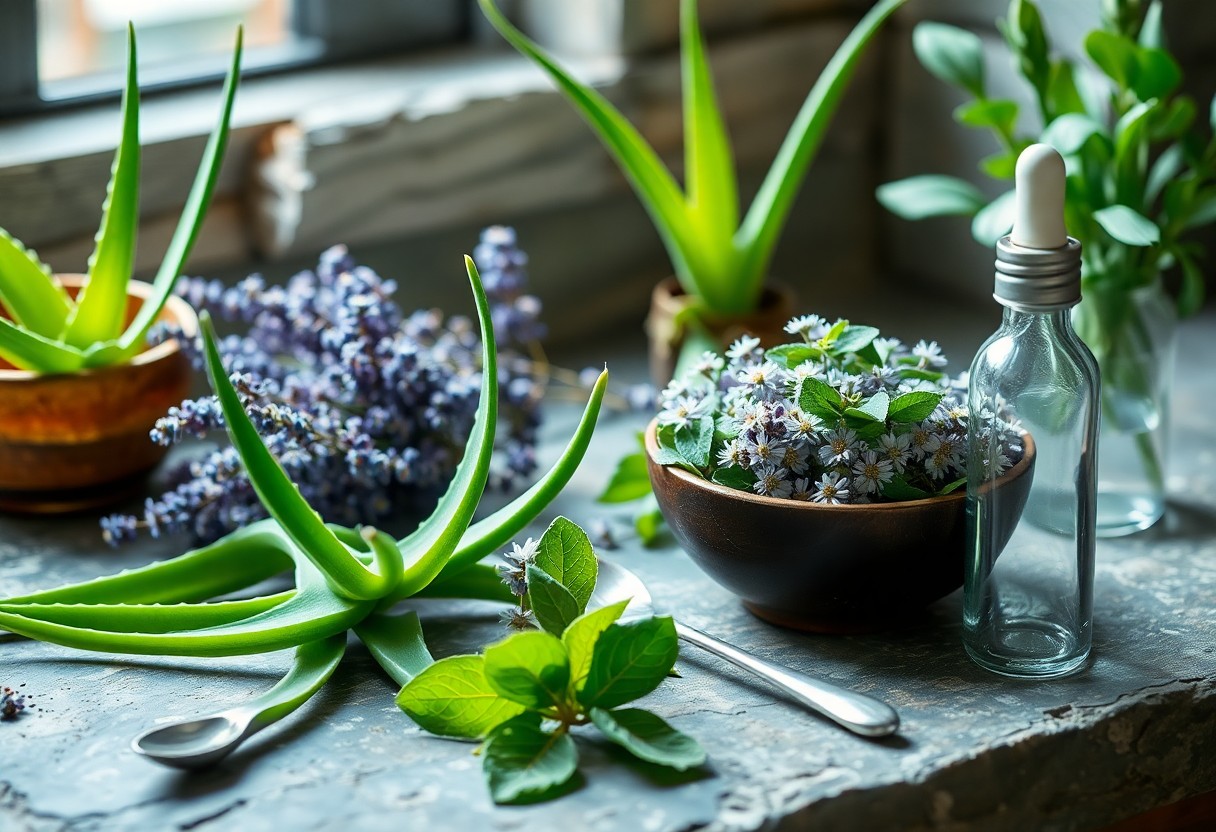With a growing interest in holistic wellness, you may be seeking effective and accessible ways to enhance your health naturally. Everyday remedies can play a vital role in your self-care routine, offering solutions for common ailments using readily available ingredients. This blog post will guide you through practical, time-tested remedies that can empower you to take charge of your well-being and promote healing in a gentle, supportive manner.

Nature’s Pharmacy: Potent Herbal Remedies
Herbs have been utilized for centuries as potent tools in the pursuit of natural healing. They provide accessible and effective solutions for common ailments, whether you’re seeking relief for digestive issues, stress, or respiratory problems. Integrating these remarkable botanicals into your routine not only empowers you to take control of your health but also nurtures a deeper connection to the natural world.
Chamomile, ginger, and echinacea top the list of time-tested herbs known for their remarkable healing properties. Chamomile helps soothe anxieties and promotes restful sleep, while ginger is a go-to remedy for nausea and digestive discomfort. Echinacea enhances your immune system, making it a popular choice during cold and flu seasons.
Integrating herbal remedies into your daily life can be done seamlessly by adopting a few simple practices. Start by infusing your meals with fresh herbs like basil, thyme, and parsley, or enjoy herbal teas during moments of relaxation. Creating a soothing herbal tincture is another effective method; for example, you can steep echinacea in alcohol to extract its medicinal properties.
Consider keeping an herbal journal where you can document your experiences with different remedies. You’ll begin to notice which herbs work best for your unique health challenges, allowing you to adjust your habits accordingly.
The Power of Nutrition: Foods that Heal
Your diet can significantly influence your overall health, as certain foods possess healing properties that can alleviate various ailments. Emphasizing whole, nutrient-dense foods can enhance your body’s natural defenses, promote recovery, and contribute to long-term wellness.
Superfoods are nutrient-rich choices that can dramatically boost your health profile. Foods like blueberries, kale, and quinoa are known for their high levels of antioxidants, vitamins, and minerals. These power-packed options can enhance immune function, improve digestive health, and even contribute to better mental clarity.
Blueberries stand out as one of the leading superfoods, rich in antioxidants like anthocyanins that combat oxidative stress. Research indicates that they may reduce the risk of heart disease and improve brain function. Kale, a cruciferous vegetable packed with vitamins A, C, and K, supports detoxification and healthy skin. Quinoa is a complete protein that aids muscle recovery and keeps you satiated longer.
Restorative Practices: Breathing and Mindfulness
Incorporating breathing exercises and mindfulness into your daily routine can profoundly impact your mental and physical well-being. These restorative practices help you connect with your body, reduce stress, and foster a sense of inner peace. By dedicating just a few minutes each day to these techniques, you can cultivate a more balanced and mindful approach to life.
Engaging in deep breathing exercises significantly benefits your mental and physical health. This practice lowers stress hormones, reduces anxiety, and enhances oxygen flow throughout your body, promoting relaxation. Studies indicate that just a few minutes of focused breathing can decrease blood pressure, improve emotional regulation, and even boost your immune response.
Adopting mindfulness techniques can transform your response to daily stressors. Focusing on the present moment through practices like meditation, mindful walking, or even conscious eating promotes a clearer mindset and diminishes feelings of overwhelm. You might start by setting aside just a few minutes each day to practice being fully aware of your surroundings without judgment.
Mindfulness can be as simple as pausing to observe your breath or the sensations in your body while you perform daily tasks. During mindful eating, savor each bite, focusing on flavors and textures rather than multitasking. These small techniques encourage you to be present, turning mundane moments into opportunities for reflection.
The Science of Traditional Healing: Ancient Wisdom Meets Modern Research
Blending age-old practices with contemporary science has led to a fascinating exploration of how traditional healing methods hold up under rigorous scrutiny. This synergy illuminates the strengths of herbal remedies, acupuncture, and other holistic practices, offering insights into how they can complement modern medicine.
Studies show that acupuncture can significantly reduce chronic pain and improve overall quality of life. Similarly, Ayurveda, an ancient Indian wellness system, has evidence supporting its approach to balanced nutrition and detoxification strategies. Research indicates that Ayurvedic practices can promote better health outcomes, particularly in managing stress and enhancing immune function.
Cultural beliefs and practices greatly influence your natural healing approach, shaping the methods and remedies passed down through generations. For instance, traditional Chinese medicine focuses heavily on the balance of energy, while Native American healing emphasizes community and spirituality.
DIY Natural Solutions: Crafting Your Own Remedies
Creating your own natural remedies is an empowering and fulfilling way to take charge of your health. By harnessing ingredients often found in your kitchen, you can develop simple solutions for common ailments, tailor-made to suit your unique needs.
Simple recipes abound for crafting your own remedies: consider combining honey and lemon for a soothing cough syrup or mixing garlic with olive oil to create a powerful anti-inflammatory agent. An herbal tea made from ginger and turmeric can alleviate digestive issues, while a homemade peppermint oil rub may ease tension headaches.
Making your own natural remedies comes with a responsibility to prioritize safety and efficacy. Always research the medicinal properties of your chosen ingredients and consult reliable sources to avoid any adverse reactions. It’s essential to consider proper dosages and the context of your health conditions.
Always check for allergies or sensitivities, and if you’re on medication, consult with a healthcare professional beforehand. Safe experimentation not only enhances the benefits of your DIY remedies but also contributes to a fulfilling healing journey.
Final Thoughts: Embracing a Holistic Approach to Wellness
Adopting a holistic approach to wellness means recognizing the interconnectedness of your body, mind, and spirit. This perspective empowers you to seek balance, nurturing not just physical health but also emotional and spiritual well-being. By integrating natural remedies into your daily routine like herbal tea for stress relief or essential oils for better sleep you open avenues for healing that align with your unique needs. Case studies show that individuals who prioritize holistic practices often experience reduced anxiety levels and improved overall health, creating a fulfilling lifestyle rooted in self-awareness and proactive self-care.

